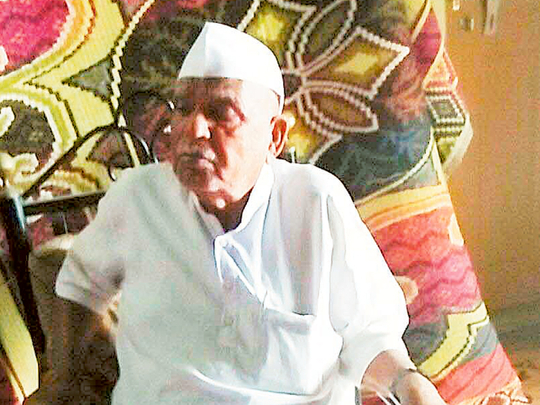
Mumbai: Maharashtra, too, has its own mountain man, Rajaram Bhapkar, 84, who has single-handedly cut through rocky hills to build roads so that his remote village would be connected with the outside world, just like Bihar’s Dashrath Manjhi, whose name has become famous everywhere.
To Bhapkar’s credit goes the construction of 40km of roads built by him in the last 57 years that has brought neighbouring villages and main roads closer to his own Gundegaon village in Ahmednagar district. Today, villagers call him ‘Bhapkar Guruji’ with respect and affection for the incredible task that he took upon himself when he decided to hack through seven hills to carve out roads with his bare hands all by himself.
“There was not even a path to connect Gundegaon with the adjoining village Kolegaon,” he told Gulf News on telephone from Gundegaon. His nephew, Santosh Bhapkar, 35, has been helping the octogenarian to speak with reporters who have been calling him up constantly to do stories on him.
What really set off his mind to embark on this endeavour was an incident he can never forget.
Decades back, a pregnant woman was being taken in a bullock cart through the bumpy tracks from his village to a nearby hospital when she delivered on the way and unfortunately, with no help nearby, the baby died. The impact of that incident made him determined to build a road from Gundegaon to Kolegaon. Villagers had to either climb across the hill to reach the market at Kolegaon or take a circuitous 29-km long route around the hill via Deulgaon. Thanks to his steely determination there is now a 10-km road and his village has been blessed with connectivity.
A seventh standard pass student who was a primary teacher in his village school, Bhapkar led a simple life and his wife and three sons — all farmers — and a daughter never opposed his resolve. The villagers, who once thought he was mad, now realise that his vision for the village was far ahead of local “netas” (leaders) and the government — which neither recognised his hard work nor paid for the roads — which in the first place was their job. On the contrary, government officials tried to bring hurdles in his path and said his work was illegal.
Every day, after school, Bhapkar would pick up his tools and walk towards the hills, sometimes hiring a labourer, and slogging for three to four hours from 5-8pm. Even after retirement, he spent all his pension money to construct the roads. Farmers sometimes offered help and he paid them whatever he could, since they were so poor.
Apart from the road to Kolegaon, he has built the Gundegaon-Kuthul road, Khandoba Ghat road that led up to the temple in contrast to an earlier tiring climb for pilgrims, a road from Manmodi to the main Nagar Road and others without using any machines. Says his nephew, “If that wasn’t all, every morning he would get down to cleaning up the village and urge us children to pick up the broom, too. We were reluctant and did not like his idea. But today we understand how service to society is so vital.”
Where irrigation was ignored in the deep rural areas, Bhapkar motivated farmers to build small dams to collect rain water. During the severe drought in 1972, when plants and trees were scorched in the heat, “my uncle collected thousands of seeds of various plants and trees and planted them everywhere when the rains came. Today, we have a forest because of him.”
As he turns 85 this November, his family and villagers are grateful to him, who they look upon as a “Mahatma” (great soul) but it has to be seen whether they, too, have the vision of this man.











